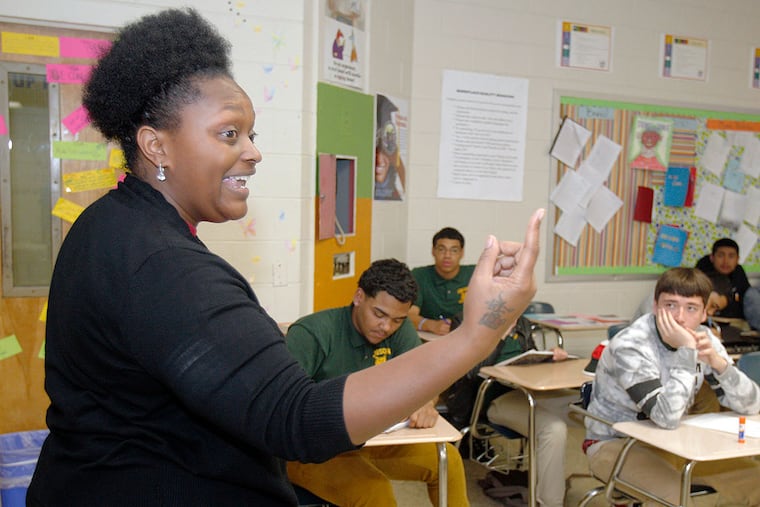Lindback Award honors 55 A-plus Philly teachers
Khalifah Bennett calls on her own experiences growing up in a tough Philadelphia neighborhood to show her pupils what they can do with their lives.

Khalifah Bennett calls on her own experiences growing up in a tough Philadelphia neighborhood to show her pupils what they can do with their lives.
Students know they can go to Michael Johnson, a gay MIT grad, for help with physics - and life.
Ambra Hook uses real-world principles to make learning come alive for the children she teaches science and engineering.
They are three of the 55 Philadelphia School District high school teachers being honored Tuesday as some of the city's best. Each will receive a Christian R. and Mary F. Lindback Award for Distinguished High School Educators.
David Loder, a foundation trustee, said the $3,500 awards are especially important in a time of unprecedented crisis for the district.
"These teachers certainly are an example of many, many good things that continue to happen every day, against all odds, in schools in Philadelphia," Loder said. "It's a particularly critical time to send a different message about our schools, and to recognize these extraordinary teachers."
Bennett was determined to avoid teaching. Practically her whole family worked for the district - cleaning people, lunch ladies, building engineers, and she dreamed of a flashier job - entertainment law, perhaps.
Still, school was always her safe place in a chaotic world. Bennett was a latchkey kid, the youngest of five children, and she saw education as an escape from the North Philadelphia neighborhood where, as a teenager, she was stabbed in the leg, arm and back attempting to break up a fight.
She graduated third in her class at Gratz High School, earned a scholarship to Temple University, but after graduation, found herself at a loss for what came next. Eventually, she returned to school and found her calling - teaching English at Edison High, not far from where she grew up.
Teaching at a neighborhood high school was important to Bennett. She found success at one, and she wanted to show her students that they could, too.
"My mom told me that it didn't matter where I went to school, that I could be successful as long as I had goals and stuck to them," said Bennett, 32, who is six years into her teaching career. "I think it's important to share my stories. My kids know that my parents struggled, that I had challenges. I think it's important for them to see someone from their community that made it, and then came back."
Michael Johnson
A host of high-paying careers awaited Michael Johnson and his physics degree from the Massachusetts Institute of Technology.
But he chose another path. Johnson moved to Philadelphia to teach science at Germantown High through Teach for America, and didn't look back. Five years later, he relishes his role teaching physics, chemistry and engineering to students at Franklin Learning Center.
He aims to "teach students how to tackle a complex problem, how to organize thoughts, how to gain the confidence to start trying things," said Johnson, 26.
This year, Johnson launched an engineering class for his freshmen students, and they are now brainstorming ideas for a final design project - a trash can with a basketball hoop or an air freshener to put under people's noses.
"The opportunity to be creative with students has been exciting," Johnson said.
Budget cuts have been a challenge, with Johnson in the same spot as all teachers - responsible for more counseling and administrative duties beyond his regular teaching functions. He had started an LGBT book club, but had to discontinue it this year because there's no money or time for it.
So he improvises, keeping the books in his classroom, welcoming students to come in and read them.
"Students know I'm gay, and they will come to know they're not alone," said Johnson.
Ambra Hook
Ambra Hook just couldn't stay away from Philadelphia classrooms.
She started teaching elementary school in the city after graduating from Cheyney University. She took time off to raise her family, attended various programs for teacher and curriculum development and graduate school in Pennsylvania, Colorado and Wisconsin. She spent time as a director in the district's office of curriculum and development.
Now, she's back in her element, teaching engineering and computer science to seventh, eighth and ninth graders at Hill-Freedman World Academy.
The veteran counts 29 years in the district, and her job now is particularly crucial, she said.
"What middle schools don't have is engineering and technology . . . and Hill-Freedman, I believe, is the only school in the city to offer engineering to middle school students," said Hook, 62.
Her class centers on solving problems or challenges with engineering principles - build a bridge with Popsicle sticks that can hold 60 pounds, build a catapult that could shoot a ping pong ball 100 yards.
Exposing her students to a variety of experiences is key to her success, Hook said.
Her students visited with chemistry majors from Temple University a few weeks ago, and they're traveling to the Marine Science Consortium on the Chesapeake Bay at the end of the month. Hook has managed to wrangle class supplies and funding for her class through fundraising and grants.
And with that support, she continues to improve Philadelphia's science curricula.
"We're building the plane," she said, "while we're flying it."
215-854-5146 @newskag